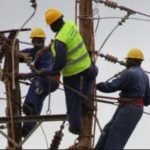The Nigerian Electricity Regulatory Commission (NERC) has reportedly blamed Distribution Companies (DisCos) for the low power distribution in the country.
The Cable reports that the commission revealed this in its newly released 2018 fourth-quarter report. It said despite the increase in power generation, distribution to customers remains a problem.
According to the data, “the generated power that is lost to gas constraints dropped to 889MW in Q4 2018 from 1,654MW in Q3 2018.
“The percentage of generated power that is lost due to the limited distribution network increased to 58% from 50% in Q3 becoming the biggest constraint in the Nigerian electricity supply industry (NESI).
Fulani herdsmen from Chad, Niger will also benefit from FG livestock plan – Bauchi governor The commission said it was working on addressing the distribution problem with DisCos.
“The commission is working on addressing the DisCos—TCN interface challenges with the aim of freeing up the generation capacity constraint by addressing the bottlenecks inhibiting the flow of energy.”
“The commission is also committed to utilising a more robust process for the thorough technical assessment of DisCos’ utilisation of capital expenditure allowances for relevance and cost efficiency to ensure that utilities invest on projects critical to addressing their technical and operational challenges.
This process is consistent with the regulatory imperative of ensuring that consumers do not pay for inefficiencies of the utilities. “Limitation in distribution networks remained the biggest constraint to the daily generation capacity utilisation as at the end of the fourth quarter of 2018.”
Meanwhile, a new tariff was approved by NERC for DisCos in the country. The NERC made this known on Wednesday, August 21, in a series of publications tagged ‘2016-2018 minor review of the 2015 multi-year tariff order’ (MYTO) for each DisCo.
Ghana immigration to deport 25 Nigerians, gives reason The documents indicate that the new tariff became effective from Monday, July 1, 2019. NERC said: “The objectives of this order are to reflect the impact of changes in the Minor Review variables for the period 2016 2018 to determine the cost-reflective tariffs for the relevant years; and to ascertain revenue shortfalls in view of the differential between such tariffs and allowed tariffs in the Nigerian Electricity Supply Industry (“NESI”).



